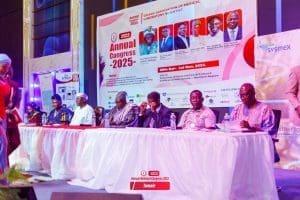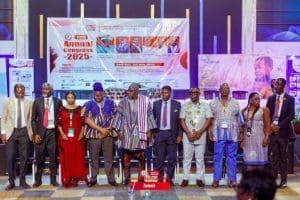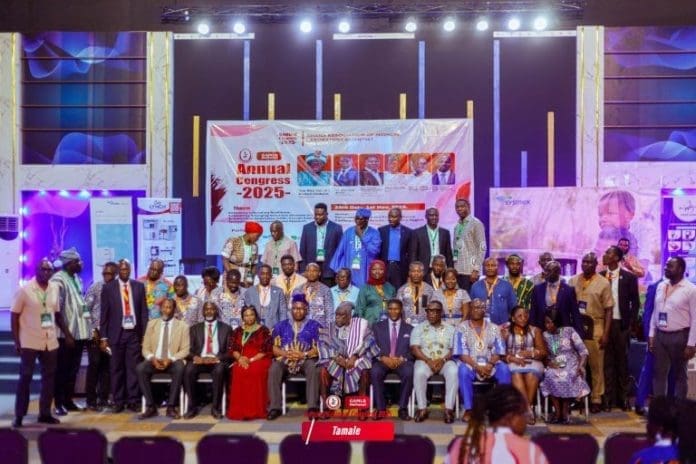Under the blazing northern sun, the city of Tamale came alive as hundreds of Ghana’s medical laboratory scientists, policymakers, academics, and students gathered for the 2025 Annual National Congress of the Ghana Association of Medical Laboratory Scientists (GAMLS).
What unfolded was more than a professional assembly—it was a declaration of purpose, a call to transform Ghana’s laboratories into resilient pillars of health security.
The theme, “Enhancing Laboratory Resilience: Combating Emerging Infectious Diseases and Antimicrobial Resistance through Emerging Technologies, Collaboration, and Research,” resonated deeply with a world still reckoning with the lessons of COVID-19 and the growing threat of antimicrobial resistance (AMR).

“Resilience is not built by chance” — Dr. Eric Kofi Aidoo
In his stirring presidential address, Dr. Eric Kofi Aidoo, President of GAMLS, set the tone for what became a national dialogue on the future of diagnostic medicine.
“It is with immense gratitude and deep pride that I stand before you,” he began, his voice firm yet hopeful. “This congress is not just a meeting—it’s a movement. A movement to reimagine laboratories as engines of health security and innovation.”
Dr. Aidoo reflected on the tumultuous years of Ebola and COVID-19, where laboratories proved indispensable. “It was our laboratories that confirmed the first COVID-19 cases, tracked variants, and generated data that guided national decisions,” he reminded participants. Yet, he cautioned, “AMR is now silently eroding decades of medical progress. We cannot wait for another pandemic to test our preparedness.”
He praised advancements in laboratory infrastructure and accreditation but lamented the uneven development between urban centers and rural facilities. “Many district labs are under-resourced, lacking the tools and systems they need. Laboratories must not be seen as cost centers, but as investments in national resilience.”
Redefining Laboratory Resilience
Dr. Aidoo’s message was clear—resilience is not about machines and buildings alone. “It’s about people, systems, and governance,” he declared.
He urged government and partners to invest in modern diagnostic technologies, from molecular platforms to digital data systems, while ensuring sustainability and quality assurance. Artificial intelligence and genomic sequencing, he emphasized, “are no longer luxuries but necessities.”
Yet, he insisted, the most critical component of resilience is the people. “Empower the scientists,” he said. “Provide postgraduate pathways, leadership roles, and fair remuneration. The heart of resilience is a motivated and skilled workforce.”
GAMLS, he announced, is engaging policymakers on sustainable financing models, including a proposal to ring-fence laboratory-generated revenues to fund system improvements.
Minister’s Pledge: “Laboratories Are the Backbone of Health Systems”
When the Minister of Health, Hon. Kwabena Mintah Akandoh, took the podium, his message aligned seamlessly with Dr. Aidoo’s vision.
“No health system can function effectively without strong laboratories,” he affirmed. “Laboratories are the backbone of disease detection, patient management, and outbreak control.”
Referencing the hard-learned lessons of COVID-19, he acknowledged the fragility of systems that ignore laboratory capacity. “Weak labs lead to misdiagnoses and delayed responses,” he warned. “Laboratory resilience must be a non-negotiable part of health sector reform.”
He revealed new collaborations between the Ministry of Health, GAMLS, and the private sector to integrate technologies such as AI, genomics, and digital diagnostics into healthcare delivery. “Smarter laboratories,” he said, “will not just diagnose but also predict and prevent disease outbreaks.”
Addressing workforce challenges, the Minister assured participants that the 2026 budget would prioritize recruitment of laboratory scientists and the establishment of a Postgraduate College of Medical Laboratory Science, fulfilling a key government promise.
He also announced steps toward creating a Medical Laboratory Science Council to regulate training, curb quackery, and enforce standards across the sector.
“From Reactive to Predictive” — Dr. Samuel Kaba Akoriyea
Dr. Samuel Kaba Akoriyea, Acting Director-General of the Ghana Health Service, brought an inspiring scientific and managerial perspective.
“When crises struck—COVID-19, yellow fever, Marburg—it was you, the laboratory scientists, who stood on the frontlines,” he said. “But resilience is not built in emergencies; it is cultivated every day.”
Dr. Akoriyea urged the transformation of Ghana’s laboratories from reactive systems to predictive and data-driven ones. He called for full adoption of emerging technologies and the One Health approach, linking human, animal, and environmental surveillance.
“The fight against AMR cannot be won without you,” he told the scientists. “Your data drives policy; your results guide treatment.”
He outlined the GHS’s plan to expand reference laboratories, strengthen logistics and quality assurance, and ensure structured career progression for laboratory professionals. “We cannot strengthen disease surveillance without strengthening the people who power it,” he concluded.
A Scholar’s Challenge: “Promote Partnerships for Long-Term Resilience”
Delivering the keynote, Prof. Japheth A. Opintan, Head of the Department of Medical Microbiology at the University of Ghana, called for a deeper understanding of “laboratory resilience.”
“Resilience is not just about surviving the next outbreak,” he explained. “It’s about building systems that adapt, evolve, and innovate.”
Citing data showing one laboratory scientist for every 4,000 Ghanaians, Prof. Opintan warned of burnout and mental health challenges in the workforce. “A burnt-out scientist means a sick country,” he said, urging GAMLS to conduct studies on workforce well-being and sustainability.
He also called for pragmatic investment in technology and financing. “Are we truly investing in laboratory infrastructure using information technology? Are we leveraging global funds to build our diagnostic capacity?” he asked.
Prof. Opintan ended with a rallying cry: “Let us promote partnerships that ensure long-term capacity and resilience. The future belongs to systems that collaborate and innovate.”
A Congress of Ideas and Resolve
The four-day congress in Tamale culminated in a communiqué that distilled the collective wisdom and urgency of the discussions. Key resolutions included:
- Strengthening microbiology capacity for robust AMR surveillance.
- Establishing a Medical Laboratory Coordination Unit within the Ministry of Health.
- Incentivizing local production of reagents and consumables.
- Reforming NHIS financing and supply chains to ensure transparency.
- Fast-tracking the Ghana Postgraduate College of Medical Laboratory Science.
- Creating a Medical Laboratory Science Council for professional oversight.
- Absorbing unemployed scientists into the public health system.
The communiqué concluded with a powerful call:
“GAMLS calls on all stakeholders—government, academia, and the private sector—to support efforts that will enhance the nation’s laboratory resilience and contribute to global health security.”

A Vision Beyond Tamale
As applause filled the conference hall, the message was unmistakable: Ghana’s path to a healthier future runs through its laboratories.
Dr. Aidoo’s closing words captured the spirit of the moment:
“Resilience is not built by chance—it is built by choice, by collaboration, and by commitment. Let us build laboratories that safeguard our future, one test at a time.”
From Tamale, a renewed vision emerged—a Ghana where laboratories are not silent backrooms but vibrant centers of innovation, research, and national security. Indeed, to build resilient labs is to build a healthier Ghana.
Source: newsghana.com.gh










